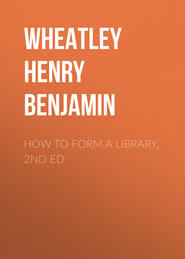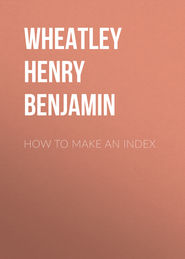По всем вопросам обращайтесь на: info@litportal.ru
(©) 2003-2024.
✖
How to Catalogue a Library
Автор
Год написания книги
2018
Настройки чтения
Размер шрифта
Высота строк
Поля
"c. Friars, who, by the constitution of their order, drop their surname. Add the name of the family in parentheses, and refer from it.
"Ex. Paolino da S. Bartolomeo [J. P. Wesdin].
"d. Persons known under their first name only, whether or not they add that of their native place or profession or rank.
"Ex. Paulus Diaconus, Thomas Heisterbacensis."
Here are, I think, two points which are open to question. Doubtless it is far better to use the correct forms of foreign Christian names than the English forms, and when the initial is the same there can be no objection; but it is not satisfactory to separate the same name over different letters of the alphabet. It must be remembered that the name in a catalogue is a heading taken out of its proper place on the title-page, for the sake of convenience, and therefore there is no impropriety or show of ignorance if these headings are in English.
As to the practice with respect to the names of saints, I think the rule is a good one; but there must be some exceptions, and Mr. Cutter's example I should treat as an exception.
Thomas à Becket, Archbishop of Canterbury, is known to most men as Becket, and under that name they would look for him. The mere fact that the Roman Catholic Church chose to canonize him does not seem to be a sufficient reason for putting him under the heading of Thomas (St.), where no one but an ecclesiastic would think of looking for him.
These rules go on to deal with Oriental authors, who are to be placed under their first names. This rule is, perhaps, the safest, if we know nothing of Oriental names; but it will often need to be departed from, and Mr. Cutter's suggestion is therefore a good one. He writes: "Graesse's Lehrbuch einer allgemeinen Literärgeschichte is a convenient guide in this matter; he prints that part of the name by which Arabic writers are commonly known in a heavier type than the rest." This is not a subject which is likely to trouble the general cataloguer much, and in the case of a multitude of Oriental works special information must be sought.
Something must now be said about Christian names. These should not be contracted, but written in full, unless a special system of contraction is adopted. Mr. Cutter suggested in the American Library Journal that the most common Christian names should be represented by an initial with a colon after it; thus, Hart, G: H:, would read Hart, George Henry; but Hart, G. H., would be read as usual, and G. H. might stand for any names. Mr. Cutter contributed a list of the abbreviations of Christian names which he adopted to the American Library Journal (vol. i., p. 405).
There is a great difficulty connected with the arrangement of Christian names in large catalogues, such as that of the British Museum, which must be overcome by means of cross-references. Suppose a certain work which you require is written by one Charles Raphael Smith. You are pretty sure to have the name given as Raphael Smith, and in consequence you will seek for the name in the secondary alphabet R, while it will really be found under C, and to this position you probably have no clue.
Sometimes cataloguers take a great deal of pains to discover a Christian name that an author has persistently dropped, but this in general only gives everyone unnecessary trouble.
In foreign titles it is not always easy to distinguish between Christian and surnames. For instance, there are a large number of surnames in Spanish which are formed from Christian names in the same way as Richards is formed from Richard. Thus Fernando is a Christian name, but Fernandez or Fernandes is a surname. Again, in Hungarian and some other languages, the surname is placed first, and is followed by the Christian name. The surname is, in fact, made into an adjective, as if we spoke of the Smithian John instead of John Smith.
A difficulty arises when authors change their name, for it is necessary to bring all the works by an author under one heading, and the question must be settled whether the first or the last name is to be chosen.
The British Museum rule is:—
"XI. Works of authors who change their name, or add to it a second, after having begun to publish under the first, to be entered under the first name, noticing any alteration which may have subsequently taken place."
This is a very inconvenient rule, as it frequently causes an author to be placed under his least known name. For instance, in the British Museum Catalogue the works of Sir Francis Palgrave are entered under Cohen, a name which not one in ten thousand persons knows to have been the original name of the historian. The reverse plan is therefore more generally adopted. Thus the Cambridge rule is:—
"7. Persons who change their names, or add a second name or a title, to be catalogued under the final form (being a surname) which their name assumes, the previous entries being gathered under this heading by means of written entries on the slip."
And Cutter writes:—
"15. Put the works of authors who change their name under the latest form, provided the new name be legally and permanently adopted."
Intimately connected with this change of name by authors is the case of authoresses who are married after they have commenced to write. Here the most convenient plan is to adopt the husband's name, except in those cases where the authoress elects to continue her maiden name. In this, as in many other cases, it is not advisable to go behind the writer's own statement in the title-page. If the author is consistent in using one name on all his or her works, there is no need to seek out a name which he or she does not use. The cataloguer's difficulty arises when different names are used at different periods of life; and, as his main duty is to bring all the works of an author under one heading, he must decide which of the different names he is to choose as a heading.
Mr. Cutter's rule is:—
"Married women, using the surname of the last husband, or if divorced, the name then assumed. Refer.
"I should be inclined to make an exception in the case of those wives who continue writing, and are known in literature, only under their maiden names (as Miss Freer, or Fanny Lewald), were we sure of dealing with them only as authors, but they may be subjects; we may have lives of them, for instance, which ought to be entered under their present names."
The Library Association rule is rather ambiguous:—
"29. Married women and other persons who have changed their names to be put under the name best known, with a cross-reference from the last authorized name."
The case of married women is carried by the British Museum rule respecting change of name which is quoted above, with the inconvenient result that Mrs. Centlivre, the playwright, who is only known by that name, appears in the British Museum Catalogue under the name Carroll.
Having dealt with some of the difficulties of modern names, we will pass on to consider some of the points connected with classical names. There is little difficulty connected with Greek authors, as they usually had but one name; but as a mixture of alphabets cannot be tolerated in the headings of catalogues, we must use the Latin form of these names, as Herodotus, not Ήρόδοτος. In this case, besides the inconvenience of different alphabets, we should have the author known to us all as Herodotus under the letter E, if we adopted the original form.
There is more to be said with respect to the names of Roman authors. Mr. Cutter's rule is:—
"18. Put names of Latin authors under that part of the name chosen in Smith's Dictionary of Greek and Roman Biography, unless there is some good reason for not doing so."
This rule is very good as far as it goes, but a general rule may be laid down which will save the cataloguer from the need of consulting Smith, except in very difficult cases. Most Latin authors have three names—the prenomen, which answers to our Christian name; the nomen, or family name; and the agnomen. In the case of Quintus Horatius Flaccus, Quintus is the prenomen, Horatius the nomen by which the author is and ought to be known, and Flaccus is the agnomen. But in the case of Cicero we have incorrectly taken to call him by his agnomen, although our ancestors correctly called him by his nomen, Tully. The same thing may be said of Cæsar, whose family name was Julius. But we must be content to follow custom in these cases. Besides the agnomen some men had a cognomen, or strictly personal name, and some had two prenomens; so that it is not safe to take the middle of three names as the nomen for certain. In some cases the prenomens of authors have been lost, and others have come down to us without agnomens.
Having dealt with the chief difficulties connected with the arrangement of the name of an author when there is no doubt about who the author is, we must now pass on to those cases where there is some difficulty in deciding as to the authorship of a book. Many titles are purposely misleading. Thus a letter addressed to some celebrated person is made to appear as if it were written by that person.
A well-known county history in six volumes, quarto, is constantly quoted as the work of one who never wrote it, on account of the misleading character of the title-page. This book is entitled, "Collections for the History of Hampshire. By D. Y. With Original Domesday of the County, and an Accurate English Translation.... By Richard Warner...." The second volume contains the Domesday, and this alone is edited by Warner. In his Literary Recollections (1830), the Rev. R. Warner remarks on this. He writes: "A circumstance somewhat singular arose out of the publication of Hampshire, extracted from Domesday Book, as the volume formed the foundation of one of the most barefaced piracies ever committed on the literary property of an unfortunate author" (vol. ii., p. 267).
Mr. Cutter's remark, already referred to, that he who is the cause of a book's existence should be treated as the author, is a perfectly just one. Thus we are in the habit of using the word "editor" rather loosely. According to the work done by the so-called editor, we shall arrange the book under his name or not. If a man takes a book which already exists and edits it with notes, he establishes no right to have its title placed under his name. For instance, if the original book has an author, it goes under his name; or if it is anonymous, it is treated by the rule that governs anonymous books. To adopt any other system would be to distribute various editions of the same book under different headings. On the other hand, if a man collects together various pieces, and forms an entirely new and substantive work, he should be treated as the author, because without his initiative the book would have no existence. Hakluyt's Principal Navigations of the English Navigators, Purchas's Pilgrimes and Pilgrimages, and Pinkerton's Collection of Voyages and Travels, are special cases about which no one would doubt; but the cataloguer will come upon cases where he may have some difficulty in deciding.
Mr. Cutter enters very fully into the points relating to corporate authors, some of which are of considerable difficulty. First among corporate authors are societies and institutions who publish proceedings; but these will be treated in the sixth chapter, under the heading of Transactions. There are, however, many other publications of corporate bodies which do not come under this heading, such as Acts, Laws, Resolutions, Reports, etc. It is scarcely worth while to discuss this point very fully here, as this class of book is only to be found in the largest libraries, where the rules are settled. Moreover, they will sometimes require to be treated differently, according to the class of library in which they are included.
According to the rules of the Cambridge University Library, they are arranged under the general (or superior) heading of Official Publications.
Academical dissertations frequently offer considerable difficulties to the cataloguer, and as the recognized authorities are not so clear in their rules upon this subject as they might be, I venture here to introduce the substance of a paper which my brother, the late Mr. B. R. Wheatley, read before the Library Association in 1881:—
On the Question of Authorship in Academical Dissertations
In the "title-taking" of these dissertations the difficulty is not in their "subjects," which are sometimes confined even to a single word, but it is in the choice of their authors' names: whether the præses, the respondent, the proponent or defendant is to be chosen. It may perhaps be thought that I am fighting with a shadow, but when it is considered that the seventh of the Rules for Cataloguing printed by the British Museum, copied afterwards into Cutter's Rules, and since, I find, adopted by the Library Association, is that "The Respondent or Defendant of a Thesis is the Author, except when it unequivocally appears to be the work of the Præses," and that nevertheless in some special catalogues, such as Pritzel's Thesaurus, Haller's Bibliothecæ, etc., and in the catalogues of the Linnæan and some other Societies' libraries, the rule has been generally adopted that the præses is the author, or at least that he takes that position from the dissertations being entered under his name—and that in a large number of collections of these dissertations, this latter rule has been frequently favoured—it will be allowed that this shadow puts on a substantial appearance, and has sufficient reality in it to bear a practical discussion. In placing before you some examples from title-pages, in illustration of the question, I must apologize for taking them entirely from works connected with Medicine and its allied sciences, as being the class more immediately ready to my hand for reference.
Before entering on the bibliographical part of our subject, you will allow me to quote, from Watts' On the Improvement of the Mind, a short summary of the method of scholastic disputation: "The tutor appoints a question in some of the sciences to be debated amongst his students; one of them undertakes to affirm or to deny the question and to defend his assertion or negation, and to answer all objections against it; he is called the respondent, and the rest of the students in the same class or who pursue the same science are the opponents, who are appointed to dispute or raise objections against the proposition affirmed or denied. It is the business of the respondent to write a thesis in Latin, or short discourse on the question proposed, and he either affirms or denies the question according to the opinion of the tutor, which is supposed to be the truth, and he reads it at the beginning of the dispute. The opponent, or opponents in succession, make objections in the form of a syllogism, the proposition in which is in reply argued against and denied by the respondent. During this time the tutor sits in the chair as President or Moderator to see that the rules of disputation and decency be observed on both sides. His work is also to illustrate and explain the answer or distinction of the respondent where it is obscure, to strengthen it where it is weak, and to correct it where it is false, and when the respondent is pinched with a strong objection, and is at a loss for an answer, the Moderator assists him and suggests some answer to the objection of the opponent, in defence of the question, according to his own opinion or sentiment."
The latter part of the above quotation seems to be the only ground for attributing an authorship to the præses, viz., that he has had so great a hand in correcting and moulding the form and argument of the essay as to be entitled to the appellation. I cannot understand the thesis being attributed to the præses on any other supposition, but if that supposition be correct, and the præses did give the candidate the information on which his dissertation is compiled, and the candidate had merely the superficial reality of the position as a defender of the statements given in his thesis, would not that circumstance be purely a literary question and a matter for a statement by foot-note? while, as the candidate for honours brings the thesis forward as his own, he must bibliographically be considered its author.
The questions also arise: is the published thesis the original thesis prepared for disputation, or is it in its printed form a combination of that thesis with such corrections and emendations as have been elicited in the discussion? Is it like a paper contributed to our societies, in which the ipsissima verba of the author are retained if the paper is thought generally worthy of publication, in despite of some of its statements having been contravened in the discussion? Is it like a drafted Bill for Parliament, or as amended in committee or by a rival committee, with the chairman's notes of addition and correction? Might not the authorship, if conceded to the præses on these grounds, be given also to a schoolmaster who suggested some of the principal points of the themes for his pupils on which they were to gain honour and distinction; or to a drawing-master, who
"In years gone by, when we were lads at school,"
put some last brilliant touches to our dull, spiritless attempts at imitation; rendering our pencillings liable, in their improved condition, to be declared by some cynical critic, much to our dissatisfaction, more our master's than our own?
In the Dissertationes Inaugurales of the Edinburgh, Leipzig, Goettingen, Berlin, Paris, and other universities, there is little or no difficulty, where the author, A. B. eruditorum examini subjicit, ex auctoritate Rectoris vel Præfecti, as, if we take, for instance, the case of the Edinburgh Dissertations, no one could suppose the hundreds of dissertations submitted for examination by aspirants for academic honours could all be attributed, either to the learned Præfects Drs. Wishart or Wm. Robertson of the last century, or to Dr. Georgius Baird of the first quarter of the present; and one of the difficulties connected with the question is, how far the usual præses in thesis with a respondent, is or is not in almost the same relative position as the rector of the above dissertations, and in fact whether the hundred and one different forms and variations of words on title-pages used in the various cases of rector and candidate for honours, præses and proponent, præses and defendant, defendant alone, præses and respondent, respondent alone, etc., are not all slightly varying representations of much the same condition of things, modified perhaps by some variety of usages, as in Sweden, for instance, which may have been more favourable to the claims of the præses than in other countries; a condition, however, which is a veritable Proteus in its many changes of shape.
Presidents, we allow to be absolute in their decisions, but in the case of these dissertations they are in an "ablative absolute" position, and therefore, I suggest, should, with few exceptions, be removed from the status of author, which belongs grammatically as well as bibliographically to the proponent, defendant, or respondent, who in the nominative case dominates the entire construction of the title-page.
The British Museum rule, as adopted by Mr. Cutter in his Rules for a Dictionary Catalogue and by our Association since, viz., "Consider the Respondent or Defendant of a Thesis as its Author except when it unequivocally appears to be the work of the Præses," does not comprehend cases where both the words respondent and defendant occur together.
The respondent is the author when words like auctor respondens are attached to his name, or when the præses is the only other name mentioned on the title, but not when there is a proponent or defendant, as in the following out of many instances I could produce:—
"De Mangano: Dissertatio quam publice defendere studebit G. Forchhammer, respondente Tho. G. Repp;" Hafniæ, 1820, 4to. "Dissertatio Medica quam auspiciis Rectoris Friderici Hassiæ Landgravii defendet P. J. Borellus, respondente H. G. Sibeckero."
I should like, therefore, to have added to that rule, "the Defendant or Respondent is the Author when either occurs separately on the title-page, but when together, the Defendant must be so considered."
In Cutter's rules for cross-referencing, he considers that one should be made from the præses to the respondent or defendant of a thesis, which I cannot but consider supererogatory; the contrary one, from respondent to præses, where the præses can be proved to be the author, has more reason in its favour.









